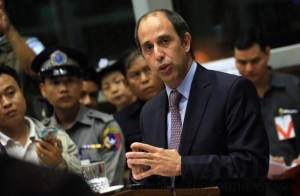UN Special Rapporteur Demonstrates Ongoing Grave Human Rights Violations
By Burma Partnership • October 28, 2013 On 24 October, the Special Rapporteur on the situation of human rights in Myanmar, Tomás Ojea Quintana, presented his report to the United Nations General Assembly. The content of Quintana’s report demonstrates a continuing and, in some cases, a worsening of the human rights situation in Burma today, thus illustrating how imperative it is for the mandate of the Special Rapporteur to be continued.
On 24 October, the Special Rapporteur on the situation of human rights in Myanmar, Tomás Ojea Quintana, presented his report to the United Nations General Assembly. The content of Quintana’s report demonstrates a continuing and, in some cases, a worsening of the human rights situation in Burma today, thus illustrating how imperative it is for the mandate of the Special Rapporteur to be continued.
Of particular concern for Quintana is the situation for Muslims in Burma in the wake of a number of outbreaks of violence in the past 18 months. There are currently 140,000 displaced Rohingya living in camps in Arakan State, segregated from the rest of society. Quintana also stated that the Burma government is not doing enough to address the root causes of this violence, one of which is the institutionalized discrimination against Rohingya, denying them legal status under the 1982 Citizenship Law. Another alarming situation for Quintana are the measures brought in since the violence that have placed restrictions on access to livelihoods, education and healthcare that enforced segregation has facilitated. Furthermore, Quintana expressed deep concern over the role of the authorities themselves in instigating the violence: “Allegations of gross violations since the violence erupted last June, including by state security personnel, remains unaddressed.”
Regarding the peace process, Quintana welcomed the latest developments towards signing ceasefires but maintained that a process of political dialogue is essential, something we have not seen in Burma yet. This inclusive political dialogue must include curbing the power of the Burma Army, which continues to commit grave human rights violations, even in areas where ceasefire agreements have been signed with ethnic armed groups. The Shan Human Rights Foundation released a statement explaining how, after attacking a Shan State Army-South position, the Burma Army used 80 villagers as human shields to escort them back to the main road before returning to their base. In Kachin State this week, it was reported that Burma Army troops entered a village, randomly opening fire and looting belongings, injuring four and leaving hundreds sheltered in a nearby church.
Quintana also noted the issue of continuing arrests of land rights activists, which he believes are politically motivated. President Thein Sein has promised that all political prisoners will be released by the end of this year. Yet only last month, the Assistance Association for Political Prisoners – Burma noted an overall increase in political prisoners, with 33 imprisoned last month alone. If President Thein Sein is serious about his claim, the Burma government needs to stop arresting peaceful protesters. Many of those arrested are charged under section 18 of the Peaceful Assembly and Peaceful Procession Act for protesting without permission from the authorities. This is a relatively recent piece of legislation, enacted by the current government, but is used as a tool to silence those who speak out and oppose harmful government policies, and particular, rampant land confiscation. That such arrests are actually increasing is very worrying.
Quintana’s report covers many more issues related to the human rights situation in Burma. It is quite clear from this report, as Quintana himself points out, that many challenges remain in Burma and are not being adequately addressed. It is therefore imperative that the international community take a united stand to pressure the Burma government to act with genuine political will to substantially improve the lives of all people in Burma and protect their fundamental human rights. It can do so by drafting and adopting a strong resolution at the current UN General Assembly and extending the mandate of the Special Rapporteur.
Tags: Burma Partnership, Human Rights Violations, Rohingya, Tomas Ojea Quintana, United Nations General Assembly Resolution, ViolenceThis post is in: Blog
Related PostsBurma Partnership Celebrates Continuing Regional Solidarity for Burma and Embraces the Work Ahead for Progressive Voice
Burma Army Displays Blatant Disregard for 21st Century Panglong Peace Process
Ann Din Coal Power Plant: Local Movement and Action to Preserve and Protect Natural Resources and Land: Mon IDP Report Case Study #4
Latest Human Rights Abuse Case Demonstrates Urgent Need to Reform the Myanmar National Human Rights Commission
Human Rights Far From Guaranteed as US Sanctions on Burma Are Removed









 All posts
All posts